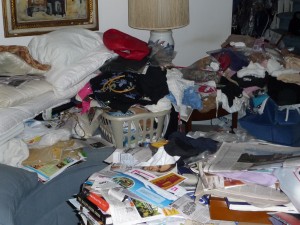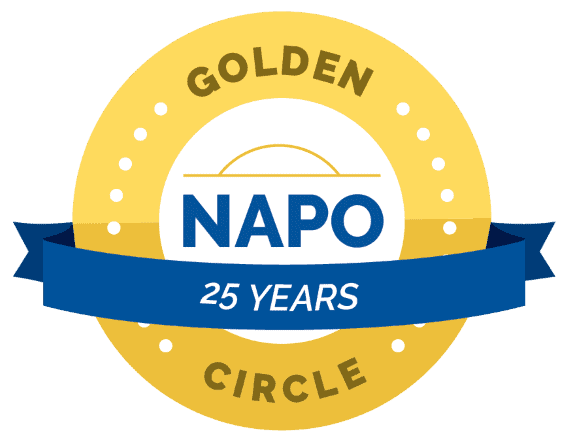In Order Blog
Why Do We Save What We Don’t Use or Need?
Is your basement, garage, or maybe even your family room filled with clutter? Do you have a functioning coffee maker in your kitchen and also two or three others in your basement? Is your son in college, but you still have bins of his baby clothes in your attic? Have you stopped hosting large family or holiday gatherings, yet you still have a cabinet filled with large serving platters and place settings for 24?

Do you have too much paper and clutter at home?
According to a new study for SpareFoot more than half of Americans say that their home is cluttered, and over 60% believe that moving to a new home is the best way to de-clutter.
The same study asked respondents why they possess so much clutter. The top explanations were:
• I feel guilty getting rid of it: 22%
• In case I need the item in the future: 63%
• To sell the items in the future: 26%
• In case I want to re-gift the item: 19%
• Sentimental reasons: 51%
So here’s my take on this…
First, you need to let go of the guilt. Just because you received something as a gift, it doesn’t mean you need to keep it forever and ever. If you don’t need it, like it, or won’t use it, don’t feel compelled to hold onto it. Sometimes it’s sufficient to keep the thought behind the gift, but not keep the physical item itself.
Next, evaluate how likely it is that you may truly need an item in the future. In most cases, if it’s been sitting unused in your basement or garage for many years, it’s unlikely that you really will need it. So, it isn’t necessary to take up valuable space storing it. And if, by chance, you did actually need it, could you borrow or rent it? Another question to think about is whether you will actually remember you saved it and remember where you stored it. How much time will it take to find/unearth it? Is that time expenditure worthwhile?
Selling items can make good financial sense….if you actually sell them. Many of my clients have great intentions, but limited time. Instead, the items sit collecting dust. Ask yourself if you really have the time and interest to post items on e-Bay, monitor the auction, wrap and package the items, go to the post office, etc. If you do, go for it! Really, go for it! But that means today, or this week. Don’t keep putting it off. Also, keep in mind that just because you paid a lot of money for an item years ago, it may not have much value today: tastes change, items go out of vogue, many members of the younger generations don’t want heavy, dark wooden furniture or gold-rimmed china that can’t go in the dishwasher.
Re-gifting, ah re-gifting. People have strong feelings on this. If you do plan to re-gift, just like if you purchase gifts ahead of time, designate a designated “gift closet” or “gift shelf” where these items are stored. When a holiday or gift-giving occasion rolls around, check that holding area before you hit the stores.
Finally, sentimentality. This is a big one for many people. I’m as sentimental as the next person, and I do believe that keeping some memorabilia is fine. The problem comes when you keep too much, or more than can reasonably be stored. You may want to consider saving things in a more useful way than just storing them in plastic totes in your basement. For example, concert or marathon t-shirts that you don’t wear can be made into a wall hanging. Children’s artwork can be turned into a coffee table book. Clothes from a deceased loved one can be stitched into a bereavement quilt. A glass-topped shadow box coffee table can also serve as a display for small collections or memorabilia.
If you need help paring down your accumulation of “stuff” and perhaps finding great ways to store what you choose to keep, give me a call at 973-334-3477.



















